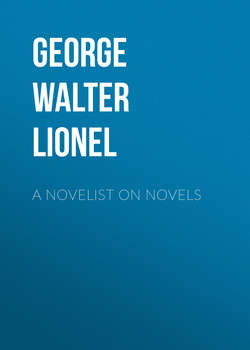A Novelist on Novels

Реклама. ООО «ЛитРес», ИНН: 7719571260.
Оглавление
George Walter Lionel. A Novelist on Novels
A Deceptive Dedication
Litany of the Novelist
Who is the Man?
Three Young Novelists
Form and the Novel
Sincerity: the Publisher and the Policeman
Three Comic Giants
The Esperanto of Art
The Twilight of Genius
Отрывок из книги
There are times when one wearies of literature; when one reads over one's first book, reflects how good it was, and how greatly one was misunderstood; when one considers the perils and misadventures of so accidental a life and likens oneself to those dogs described by Pliny who run fast as they drink from the Nile for fear they should be seized by the crocodiles; when one tires of following Mr Ford Madox Hueffer's advice, 'to sit down in the back garden with pen, ink, and paper, to put vine leaves in one's hair and to write'; when one remembers that in Flaubert's view the literary man's was a dog's life (metaphors about authors lead you back to the dog) but that none other was worth living. In those moods, one does not agree with Flaubert; rather, one agrees with Butler: —
One sees life like Mr Polly, as 'a rotten, beastly thing.' One sighs for adventure, to become a tramp or an expert witness. One knows that one will never be so popular as Beecham's pills; thence is but a step to picture oneself as less worthy.
.....
Consider, for instance, the Order of Merit, one of the highest honours that the British Crown can confer. At the end of last year it numbered twenty-one members. Among them were some distinguished foreigners, Prince Oyama, Prince Yamagata and Admiral Togo; historians, pro-consuls, four Admirals … and one novelist. Mr Thomas Hardy. We do not complain that only Mr Thomas Hardy was chosen, for there is nobody else to set at his side … only we do complain that in this high order four admirals find a place. Are we then so rich in admiralty, so poor in literature? The same is still truer when we come to the inferior orders, which are still fairly high, such as the Commandership of the Bath. That ancient order is almost entirely recruited from amongst soldiers, sailors, politicians, and civil servants; it does not hold the name of a single novelist. No novelist is a Privy Councillor, though the position is honorific and demands no special knowledge. On the Privy Council you find labour members of Parliament, barristers, coal owners, sellers of chemicals and other commodities, but no novelists. In all the other orders it is the same thing; for novelists there are neither commanderships of the Bath, nor of the Victorian Order, nor of St Michael and St George, no honours great or minor; no man has ever in England been offered a peerage because he wrote novels; and yet he has been offered a peerage because he sold beer. George Meredith was not offered a peerage, even though some think that his name will live when those of captains and kings have melted into dust. Our little band of recognised men, such as Sir James Barrie, Sir Anthony Hope Hawkins, Sir Rider Haggard, Sir Arthur Conan Doyle, small is the toll they have taken of public recognition; perhaps they should not expect it; perhaps they have been recognised only because of certain political activities; but must we really believe that so many lawyers and so few writers are worthy of an accolade? Is the novelist worthless until he is dead?
This picture may seem too black, but it is that of Great Britain, where contempt for literature has risen to a peculiar degree. Make an imaginative effort; see yourself in the drawing-room of some social leader, where a 'crush' of celebrities is taking place. A flunkey at the head of the stairs announces the guests. He announces: 'Lord Curzon! … Mr Joseph Conrad! … The Bishop of London!' Who caused a swirl in the 'gilded throng?' The cleric? The politician? Or the novelist? Be honest in your reply, and you will know who, at that hypothetical reception, created a stir. The stir, according to place or period, greeted the politician or the bishop, and only in purely literary circles would Mr Conrad have been preferred… For the worship of crowds goes to power rather than to distinction, to the recognised functionary of the State, to him whose power can give power, to all the evanescent things, and seldom to those stockish things, the milestones on the road to eternity. The attitude of the crowd is the attitude of the State, for the State is only the crowd, and often just the mob; it is the chamberlain of ochlocracy, the leader who follows. In all times, the State has shown its indifference, its contempt, for the arts, and particularly for literature. Now and then a prince, such as Louis of Bavaria, Philip of Spain, Lorenzo the Magnificent, has given to literature more than respect. He has given love, but that only because he was a man before a prince. The prince must prefer the lawyer, the politician, the general, and indeed, of late years what prince was found to patron George Meredith or Henry James?
.....